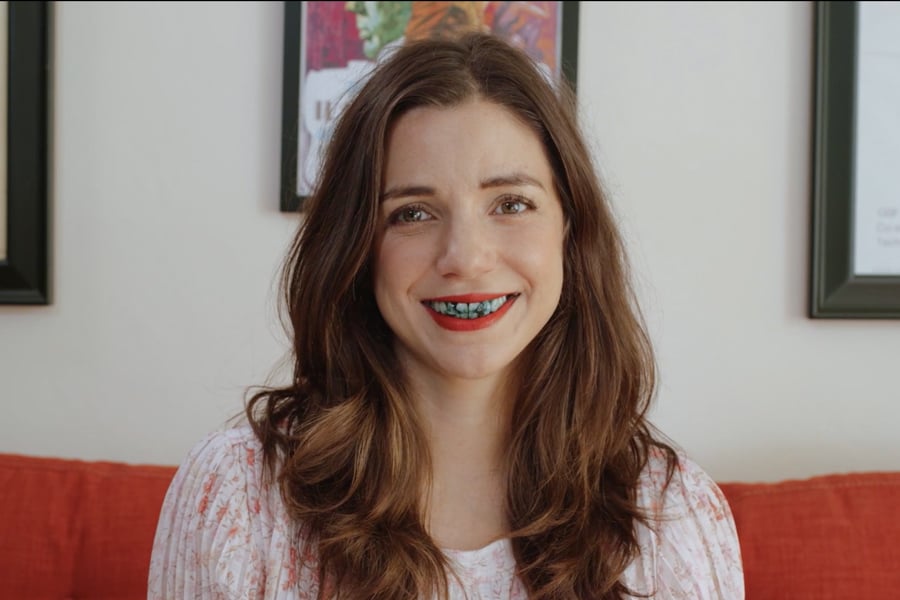Northwestern alumna Megan Rosati develops TV pilot from feminine horror pitch
NU alumna Megan Rosati (Communication ’05) flashes a creepy grin in her pitch video for “Bloom.” Rosati is currently developing the pilot’s script.
October 4, 2017
A&E
Plush couches, light pink dresses and soothing voices aren’t typical trademarks of horror, but they’re exactly what helped Megan Rosati (Communication ’05) get a contract to develop her own TV show.
The application for “Clive Barker presents: Reel Fear Horror Contest” asked filmmakers to submit short video pitches detailing their ideas. While other entries included blood, guts and monsters, “Bloom” featured Rosati sitting on a bright red sofa, drinking tea.
“I want to make a trippy nightmare of a body horror movie that is also soft, quiet, feminine,” Rosati says in the video. “Because in my worst nightmares, I’m too scared to scream.”
Rosati did not win the final round of the contest, but some of the producers were impressed and offered her a contract to create a pilot and storyboard the series, she said. Rosati is currently in the process of developing the pilot’s script.
Kate Grady, one of the producers for “Bloom,” said she’s excited to see how the series grows from the original video Rosati submitted to the contest.
“Her unique pitch opened us up to a world of dark twisted horror within an Instagram perfect wrapper,” Grady told The Daily in an email.
The show’s prospective plot revolves around a young woman, Anne, who is obsessed with maintaining her appearance. Anne works for a health and wellness company, and, as an employee, receives its supplements for free. While those supplements help at first, she later begins to decay from the inside out, and strange, dark cysts grow on her body.
To develop realistic aspects of the show, Rosati said she drew on personal experiences from her most recent job in the health and wellness industry.
“Let’s just say if this show was an ex-boyfriend, he’d be so offended,” she said.
The horror elements were inspired by Rosati’s disapproval of the industry equating beauty with health and preying on the confusion of young women, she said.
“I just think it’s spooky how people just trust the makers of these products and trust that they’re not going to do something crazy to you,” she said.
“Bloom” is Rosati’s first professional foray into horror. She previously focused on comedy due to the low budget necessary to create high-quality material, she said. Her most recent web series, “52 Ways to Break Up,” was profiled by New York magazine.
Theater Prof. Mary Poole, Rosati’s former acting teacher at NU, said Rosati was very talented in balancing both serious and comic projects during her college career. Poole said she’s glad Rosati finally discovered her niche in the entertainment industry.
Poole said most students in her class wanted to partner up with Rosati on acting assignments.
“(Rosati) was always enormously collaborative,” she said. “She worked beautifully with other students.”
Rosati said her experience in comedy benefitted her transition to horror, as both genres utilize similar techniques to achieve different goals.
“Both are all about timing,” she said. “In comedy you build up to the laugh, in horror you build up to the scare.”
Her interest in horror began at a young age, and came largely from its favorable portrayal of female characters, she said.
“(Horror is) one of the few genres where a woman can go on an adventure and be the center of attention, and it’s not about finding a guy,” Rosati said.
Rosati said although the horror film industry is dominated by men, she has never felt belittled by her male colleagues and has received strong support throughout the entire production process.
If anything, it was Rosati who had the upper hand in a recent production meeting for “Bloom.” She wrote a graphic sequence involving period sex, and the men in the room continually referred to it as “that one scene,” she said.
“I was like, ‘I wrote it, it’s OK, you can say it,’” Rosati said. “Part of the reason I got into this genre is because there aren’t many women working in it. I want to be like the Lena Dunham of horror. It’s definitely been a victory for me as a feminist and a filmmaker, getting guys to talk about period sex.”
Email: [email protected]
Twitter: @jreck96


